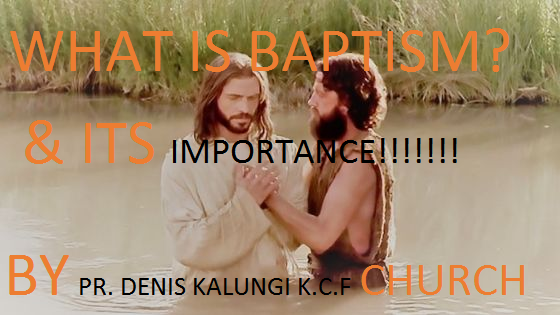| Author: Pr. kalungi Denis | August 25, 2021 | 1189 views | 0 comments |

PR. DENIS KALUNGI KIREKA CHRISTIAN FELLOWSHIP.
WHAT ARE BAPTISMS AND THEIR SIGNIFICANCE?
When we enter the waters of baptism, we’re proclaiming the gospel message. Jesus died for our sins, was buried, and lives again. By joining in baptism, we’re identifying ourselves with Him. Romans 6:4 says we have been buried with Him through baptism into death.
We’re now dead to the power of sin. Being raised up out of the water expresses our new life in Christ and our union with Him.
Christian baptism is one of two ordinances that Jesus instituted for the church. Just before His ascension, Jesus gave his disciples the last instructions (known today as the Great Commission), “Go and make disciples of all nations, baptizing them in the name of the Father and of the Son and of the Holy Spirit, and teaching them to obey everything I have commanded you. And surely I am with you always, to the very end of the age” {Matthew 28:19–20}.
In the above paragraph baptism is after belief, see herein {Mark 16:16}, whoever believes and is baptized will be saved, but whoever does not believe will be condemned. So baptism can also signify belief and believing in Christ is a sure deal for heaven see herein {John 3:5}.
These instructions specify that the church is responsible to teach Jesus’s word, making disciples, and baptizing those disciples. These things are to be done everywhere (“all nations”) until “the very end of the age.” So, if for no other reason, baptism has importance because Jesus commanded it.
Baptisms fulfill the righteousness let us see herein {Mathew 3:13-15}, Then Jesus came from Galilee to the Jordan to be baptized by John. But John tried to deter him, saying, “I need to be baptized by you, and do you come to me?” Jesus replied, “Let it be so now; it is proper for us to do this to fulfill all righteousness.” Then John consented.
John was baptizing people for repentance, yet he recognizes Jesus has no reason to repent. Upon trying to deter Jesus from this act, Jesus tells him, “It is proper for us to do this to fulfill all righteousness.” As Jesus began his public ministry, He was baptized. If Jesus was baptized, why shouldn’t we be baptized?
When we enter the waters of baptism, we’re proclaiming the gospel message. Jesus died for our sins, was buried, and lives again. By joining in baptism, we’re identifying ourselves with Him. {Romans 6:4} says we have been buried with Him through baptism into death. We’re now dead to the power of sin. Being raised up out of the water expresses our new life in Christ and our union with Him.
If the meaning of baptism could be boiled down to one word, that word would be identification. Baptism speaks primarily of personal, public identification with Jesus Christ.
It is your personal identification with the greatest act of human history—the death, burial, and resurrection of Jesus Christ. Baptism doesn't save you—salvation comes by faith alone {Ephesians 2:8-9}. Your guilt before God is removed the moment you trust in Christ. But baptism is your personal testimony to, and the inward assurance of, your passage from the old life to the new life...
Baptism is to be done in the name of the Father, Son, and Spirit—this is what makes it “Christian” baptism. It is through this ordinance that a person is admitted into the fellowship of the church. When we are saved, we are “baptized” by the Spirit into the Body of Christ, which is the church. First Corinthians 12:13 says, “We were all baptized by one Spirit so as to form one body—whether Jews or Gentiles, slave or free—and we were all given the one Spirit to drink.” Baptism by water is a “reenactment or rebuilding” of the baptism by the Spirit.
Christian baptism is the means by which a person makes a public profession of faith and discipleship. In the waters of baptism, a person says, wordlessly, “I confess faith in Christ; Jesus has cleansed my soul from sin, and I now have a new life of sanctification.”
Christian baptism illustrates, in dramatic style, the death, burial, and resurrection of Christ. At the same time, it also illustrates our death to sin and new life in Christ. As the sinner confesses to the Lord Jesus, he dies to sin {Romans 6:11} and is raised to a brand-new life {Colossian 2:12}.
Being submerged in the water represents death to sin, and emerging from the water represents the cleansed, holy life that follows salvation. Romans 6:4 puts it this way: “We were therefore buried with him through baptism into death in order that, just as Christ was raised from the dead through the glory of the Father, we too may live a new life.”
Very simply, baptism is an outward testimony of the inward change in a believer’s life. Christian baptism is an act of obedience to the Lord after salvation; although baptism is closely associated with salvation, it is not a requirement to be saved. The Bible shows in many places that the order of events is 1) a person believes in the Lord Jesus and 2) he is baptized. This sequence is seen in Acts 2:41, “Those who accepted [Peter’s] message were baptized” see also Acts 16:14–15.
A new believer in Jesus Christ should desire to be baptized as soon as possible. In Acts 8 Philip speaks “the good news about Jesus” to the Ethiopian eunuch, and, “as they traveled along the road, they came to some water and the eunuch said, ‘Look, here is water. What can stand in the way of my being baptized?’” (Verses 35–36). Right away, they stopped the chariot, and Philip baptized the man.
“Then Philip began with that very passage of scripture and told him the good news about Jesus. As they traveled along the road, they came to some water and the eunuch said, “Look, here is water. Why shouldn’t I be baptized?” And he gave orders to stop the chariot. Then both Philip and the eunuch went down into the water and Philip baptized him.” Acts 8:35-39






